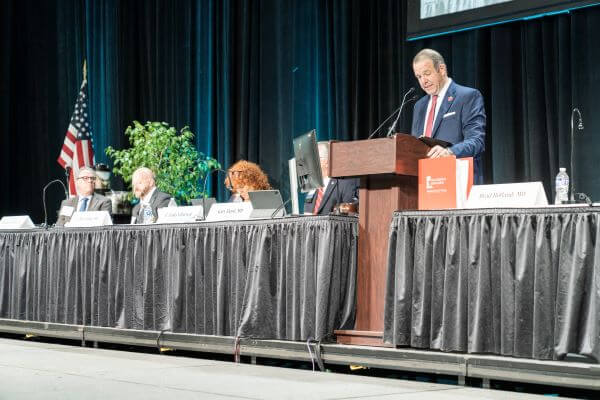
Among several organizational decisions, the Texas Medical Association House of Delegates (HOD) voted to pilot virtual voting in HOD elections at its annual policymaking meeting last week.
The notion of remote voting had, by this session, come before the Board of Trustees twice, and opinions remained mixed when the Reference Committee on Financial and Organizational Affairs called for testimony.
Some physicians were united in their concern that virtual voting would discourage TexMed attendance and therefore hinder TMA participation. On the other hand, a diverse range of physicians across geography, age, and specialties testified in firm support of the committee’s recommendation to adopt the resolution.
Among them was Henrietta family and emergency medicine physician David Greer, MD, a TMA member for over 50 years. In his nearly 45 years in a solo family practice, with only one other physician in town, only one physician could leave for TMA business at a time.
“I’d like to see TMA reach out and include people who are not able to attend for various reasons, whether it be geographic, for coverage [reasons], for monetary reasons – which are very practical reasons in these times,” Dr. Greer said.
While much testimony centered on representing rural physicians in TMA, Bruce Palmer, MD, a cardiologist from Wichita Falls, pointed out the universal practicality of the resolution.
“I don’t completely see this as a rural versus metro issue. We’re doctors and we’re busy,” Dr. Palmer said, noting that even members from large cities may be underrepresented at TexMed if their specialty is too specific to have another physician cover their responsibilities.
The resolution enacts a two-year pilot trial of virtual HOD election voting, through which time TMA can determine its effectiveness for representation and participation.
Also following up on the long-term work of TMA’s Justice, Equity, Diversity, and Inclusion (JEDI) Task Force, the house adopted policy devised by the group which enumerates six principles of professional decorum at TMA events, the first two being, “We will be considerate to and respectful of our peers," and "We do not tolerate harassment in any form, including physical, sexual, or psychological harassment."
The resolution has no punitive element; rather it will serve as a professional standard, says JEDI co-chair, TMA Board of Trustees member, and Houston neurologist Kimberly Monday, MD.
Her fellow co-chair Kevin McKinney, MD, a Galveston endocrinologist, summed up the resolution even more succinctly: “Don’t be a jerk.”
Dr. McKinney says he hopes this ideology continues even now that the JEDI task force sunsetted at this year’s TexMed.
Other items adopted on recommendation by the committee included:
- The creation of a standing committee on behavioral health, building on the existing subcommittee on behavioral health.
- TMA policy condemning workplace bullying and encouraging health care organizations to take actions to counter it.
- TMA policy to support public transparency of prescriptive authority and supervision relationships between physicians and non-physician practitioners. This includes “clear, transparent, and conspicuous public posting of the full name, licensure type, primary board certification type with specialty if applicable, and primary practice address of the supervising physicians of non-physician practitioners.”
Delegates also referred a small number of resolutions for further study, having recognized their potential importance but acknowledging a need for further information and refinement, especially those that could intersect with the Texas Legislature:
- Proposed policy that TMA seek the removal of criminal enforcement of physicians where there is no criminal intent. The policy largely focused on two potential avenues for this, one relating to effecting a do-not-attempt-resuscitation, or DNAR, order, and one relating to the therapeutic termination of pregnancy. Because of concerns around grouping the two cases, and to allow time to consider decisions made in the 88th Texas Legislature, the committee recommended referral.
- Proposed policy that the TMA Council on Legislation establish interim legislative positions for the association consistent with existing TMA policy. This proposal received overwhelming amounts of testimony both in support and against, reflecting the complexities of successful legislative advocacy. Given the difficult balance, the committee recommended referral.